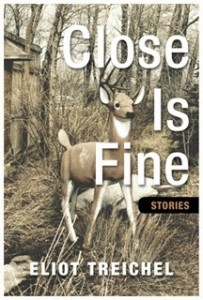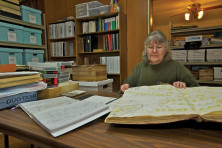“Close Is Fine” by Eliot Treichel
- Share
- Tweet
- Pin
- Share

Eliot Treichel might well have called his collection of short stories Men Behaving Badly. Close Is Fine, the title story in his slim volume, hints at the moral nature of the central characters, men who make bad choices, males who break both laws and vows of love – in short, who are not good citizens. Tanner in “Close is Fine” is guilty of all of the above; “Congratulations on becoming an a******,” his wife Kirsten shouts at him.
But Treichel’s characters are believable Wisconsin people who make the Antigo area their home. A tavern owner who illegally adopts a bear cub, an elementary school teacher who has an affair with a woman dogsledder, an inept soccer player with Papermaker pride – none are candidates for citizen of the year.
However, just as Michael Perry brought to life the Wisconsin small town New Auburn in his Population 485 (and subsequent memoirs), so has Treichel celebrated both the quirkiness of characters in his hometown and the realities of their rural life. For example, two teenage guys in “Good Potato Soil” reveal an undeveloped adolescent sense of morality in their work and play, sharing a house with a “mentor” who, as he wrote in a note to them, “failed my piss test and they’re taking me off to jail.” The boys pass time by breaking stuff in an old barn foundation.
Katherine Mansfield in her early twentieth-century short stories attempted to free herself from the “tyranny of plot.” Treichel has severed ties to the conventions of getting a cat up a tree, and then getting it down again. But while he avoids traditional resolutions, his narratives are nonetheless engaging; he creates tension as his characters put themselves at risk, whether for physical harm, legal trouble, or simply a compromised reputation. The book is a quick and satisfying read. And while the tales tend to be dark, they are never nihilistic.
A Wisconsin native, Eliot Treichel earned an MFA from Bennington College and now lives in Eugene, Oregon, where he teaches at Lane Community College. He told interviewer Tyler McMann that his stories take place in an area in northern Wisconsin “where it looks really desperate and rundown, but it’s actually quite rich; there’s community there, there’s diversity, the landscape is both a burden and something that gives the place life.
“Wisconsin is very beautiful,” he continued, “but it’s also very flat and muted, and has harsh winters, so there’s this attitude of enduring; and I think that’s the thing I want to speak to, the idea of perseverance and enduring. Maybe it’s my Lutheran upbringing of sucking up, and trudging on even though it’s crappy and cold out, and finding a way to go on.”
In the final story of the collection the narrator, a volunteer fireman, has issues with his father, the fire chief. As the story concludes, the father accidentally slips into the river and the son jumps in after him:
“The cold water seeped through my clothes,” the son said, “enough so that I started panting from the shock of it. I wanted to plunge under, where it was dark and icy and quiet, but I had one arm wrapped around my father and I could feel his heart pounding hard.
“The river was shallow enough to touch bottom, but instead my father and I just floated there, with Chip’s flashlight in our eyes.
‘I got you,’ I said, holding tight. ‘We’re not going anywhere.’”
On Reading Short Stories
While many readers prefer novels to short stories, some of us find that reading a collection of short fiction by a single author is as satisfying as finishing a novel. Although the stories may deal with a variety of characters, conflicts, and settings, they are usually unified by tone, theme, and voice. When all is said and done, the two genres sometimes have more in common than a reader might think.


